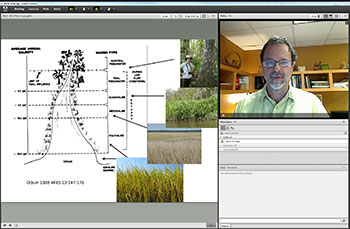Course has More Than 200 Participants
Steve Pennings, a professor of biology and biochemistry at the University of Houston, is collaborating with other faculty around the country to offer a massive online graduate course, “Sea Level Rise and Saline Intrusion into Coastal Habitats.”

Steve Pennings delivers a course lecture on herbaceous wetlands using Adobe Connect
software.The course is being offered for credit at 20 universities around the country. More
than 200 people are participating, including over 130 graduate students and 48 faculty
members at over 30 academic institutions, and more than 25 managers representing six
National Estuarine Research Reserves and nine city, state and federal agencies.
The course is highly interdisciplinary, covering the climate and oceanographic drivers of sea level rise; coastal geomorphology; effects of sea level rise on groundwater, biogeochemistry and ecology; and how human societies respond to sea level rise to minimize or exacerbate its effects.
Lectures are being delivered online by 14 experts from around the country.
“This course is an example of how technology can greatly improve graduate education,” Pennings said. “No university by itself could offer a specialized graduate course like this one that allows students to interact with so many experts in a field.”
This is the second time the course has been offered. Pennings said the plan is to offer the course every two years.
“By meeting online and drawing in experts from around the country, we can both offer a course with superb content, and make it available to a large number of participants at multiple institutions,” he said.
Many of the participants in the course are part of Long-Term Ecological Research (LTER) sites with an emphasis on coastal habitats. Pennings is the co-principal investigator of the Georgia Coastal Ecosystems LTER program; the connection to the LTER network provided the initial impetus for developing the course.